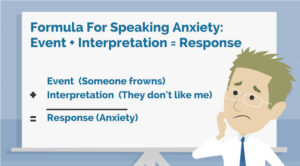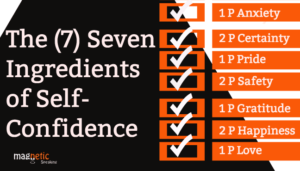When confronted with public speaking fear or anxiety – working on your most valuable asset – your confidence- becomes essential.
Your confidence is the foundation of your delivery skills and content.
It doesn’t matter if you know all the content in the world or if you are practiced in all the delivery skills possible, and you can’t stand in front of the room and share with an audience if you lack confidence.
I had to deal with public speaking fear myself. I know that sometimes you feel powerless. I felt that way too once.
That’s why I am writing this post to share with you what worked for me, and what has worked for my close one-on-one coaching clients.
Through research and experimentation, I found that public speaking confidence rests on four pillars
1- Your Identity
Your identity is how you see yourself. Most people see themselves as the job they hold (engineer, project manager, product designer, account manager, etc…), or as one of their roles in life (father, mother, family man, big sister, etc…).
The problem with holding your identity as one of these two categories is that you are limiting yourself.
For a long time, I felt insecure about being a professional speaker, because on the inside I saw myself as an engineer and not as a professional speaker.
That’s when I decided to change my identity to a “Leader” instead. Notice that I did not change it to a professional speaker (Because that’s just a job). I wanted something more encompassing.
Choose a grand and encompassing identity – like a leader, mover, and shaker, entrepreneur, magician, etc. (feel free to experiment until you find something that fits).2- Your beliefs
“Whether you think you can, or you think you can’t–you’re right,” said Henry Ford. It applies to public speaking as well.
If you believe that you can’t do public speaking, If you believe that it’s hard, If you feel that you are not good enough, not old enough, or too old, then that will cause you uncertainty when you speak.
Some beliefs I consciously adopted to increase my confidence are the following:
- I am good enough
- I am a great speaker
- I am old enough
- Public speaking is easy
- Public speaking is like one-on-one speaking
- Public speaking is an innate ability for human beings
I constantly keep tabs on my beliefs to make sure they are aligned to give me confidence instead of anxiety.
One note about beliefs is that they are not necessarily truths. If they were the truth, then they would be called truth. A belief is an assumption we make that helps us operate in the world. Most of our lives and society are built on these assumptions.
Since these beliefs are not truths and just assumptions, then we might as well adopt beliefs that serve us instead of hinder us.
Your Past Experience
Our brains assess new experiences by comparing them to something similar in the past. If you had bad public speaking experiences from the past, then every time you speak your brain is going to bring these experiences to the front. That will make you anxious.
These experiences can be few big bad experiences or a collection of smaller ones. Either way, you have to deal with them or counterbalance them with good experiences.
To deal with my bad experiences, I used Neuro-Linguistic-Programing (NLP). I studied NLP and applied what I learned to myself.
I also counterbalanced the bad experiences with good ones by speaking at Toastmasters and other groups. The friendlier the group, the better – it allowed me to accumulate a new set of positive public speaking experiences.
I believe that the second way worked better for me. Dealing with past experiences helped, but adding the new positive experiences helped even more. This is why we keep our classes and training programs fun, interactive, and approachable.
Your Conditioning
A lot of times you might think that there is no logical reason for you to be anxious anymore.
You are right; anxiety is not logical, especially, if it’s a conditioned response.
If for a while you felt nervous every time you presented, then your body gets conditioned to feel nervous every time you present.
Even if you build your identity, if you change your beliefs, and correct all your past experiences, anxiety can still be triggered because it is a conditioned response.
The best way to get rid of the conditioning is to start associating fun with public speaking. You can do this by doing outside the box things to express yourself like take acting classes, stand up comedy, or do a full day intensive training on public speaking and presentation skills.
Depending on how deep and long the conditioning, the process of de-conditioning your anxiety response might take some time.
Public speaking is important for your career, and it’s important that you build your skills and content on a solid foundation. The foundation of public speaking is your confidence.
Hope you found this article useful – please share your thoughts, ideas, or questions in the comments below – I always read all of them.



